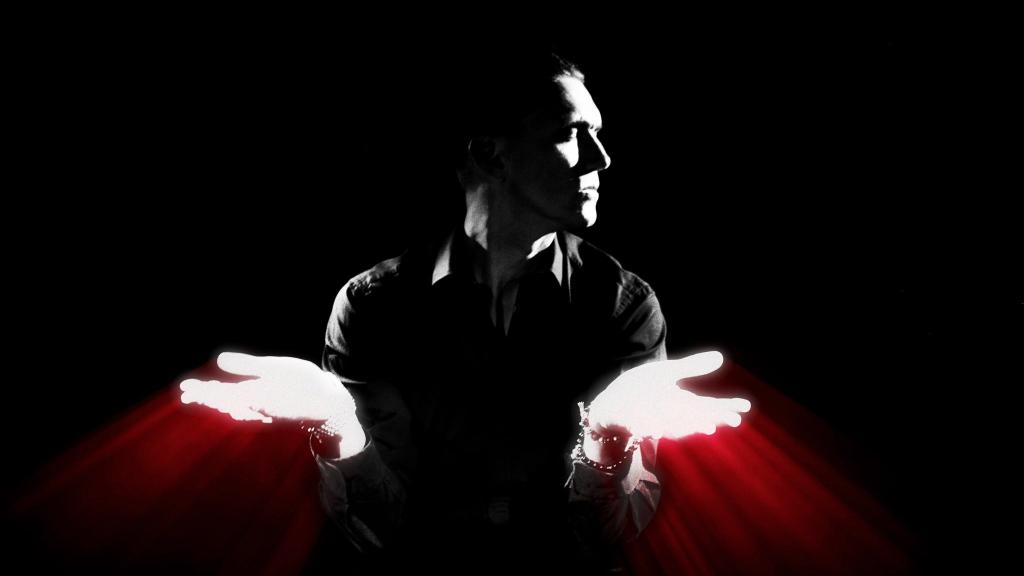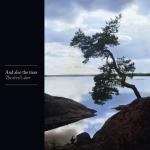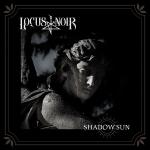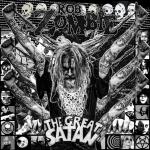PIG is the main project of British musician & producer Raymond Watts, a founding member of German industrial mastodon KMFDM. Since the early 80’s, not only has he been prolific with his own project PIG - who’s considered a groundbreaking icon in the industrial music scene, but also active in his involvement with pioneers and peer musicians throughout the world (Foetus, Einstürzende Neubauten, Psychic TV, SCHAFT, SCHWEIN and many more). PIG’s original mix of musical influences, emphasized by his danceable beats, his magisterial voice & charismatic presence, by his references to pork products and tendency to tease others has made it a favorite among many including Nine Inch Nails’ frontman Trent Reznor, who took the band on the road in 1994. Later on, Raymond Watts worked with supergroup SCHAFT along with Imai Hisashi (BUCK-TICK) and Fuji Maki (Soft Ballet). He then formed SCHWEIN with Sascha Konietzko (KMFDM) and close friends Imai Hisashi and Sakurai Atsushi (BUCK-TICK) in 2000. In 2006, after burning himself out on drugs, drinks and music, Raymond Watts went on a hiatus that would last for nearly a decade. During this time, the artist composed music for fashion shows - including the ones of fashion icon Alexander McQueen - film soundtracks and video games. In 2016, PIG returned to the music scene with an album, 'The Gospel', co-written and co-produced by Z. Marr (ex-COMBICHRIST). Raymond Watts has been, ever since, extremely creative and fertile in his songwriting for PIG. After a run of albums and EP’s, Watts released 'The Merciless Light' in 2022 (review, here). Today, we are extremely happy to interview the mastermind behind PIG. Fasten your seatbelt and brace yourself for impact. It's worth the trip !
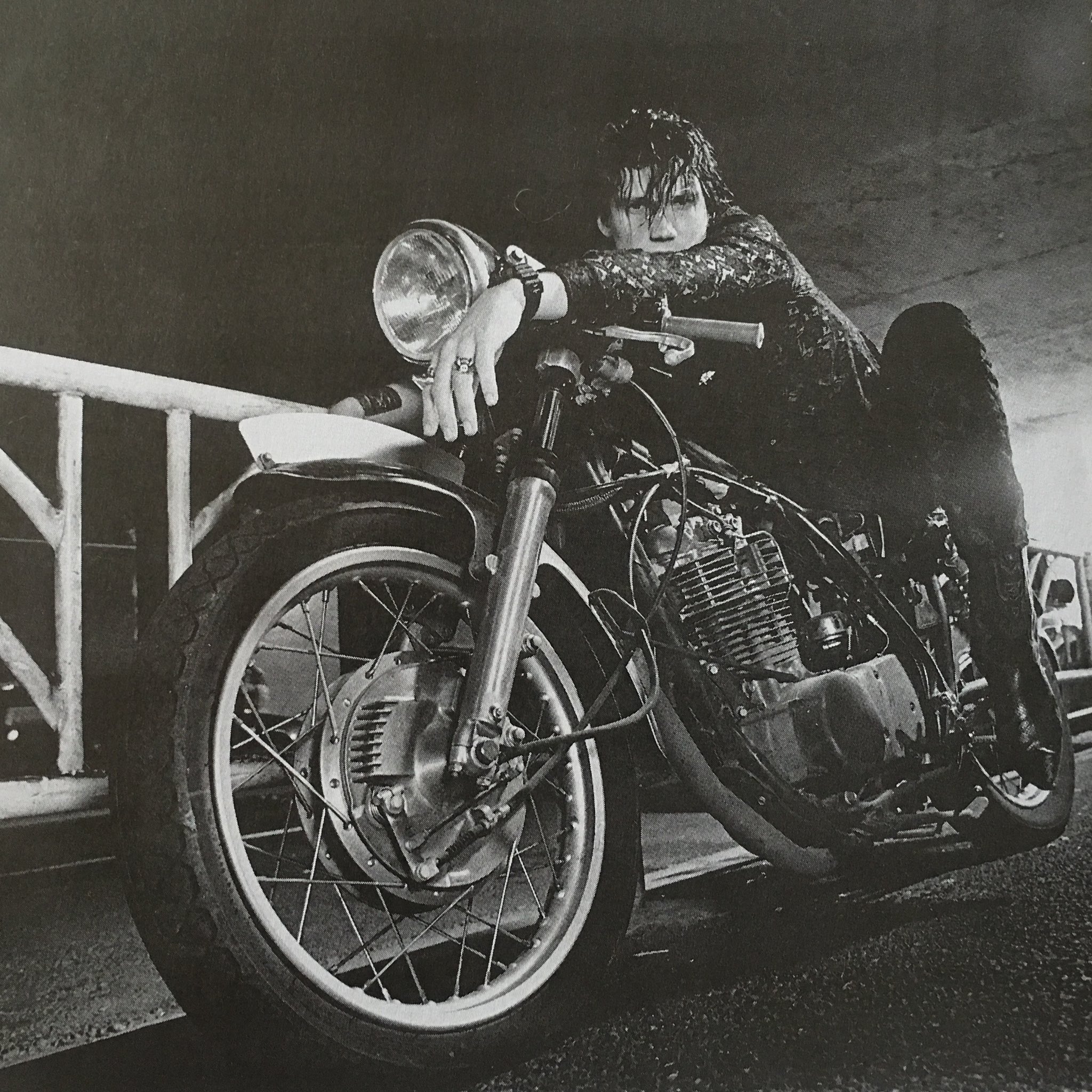
Thank you, Raymond, for meeting me while on vacation. It’s a real global era, you’re English, I’m French and we’re having this interview here, in Tokyo, Japan. How are you enjoying your trip to the Land of the Rising Sun?
Raymond : It’s been very lovely so far. I came here many, many times in the past. It is a country very dear to my heart. I have traveled to Japan 25 times or more in my life. But, it was always for work. Every time, it was a non-stop working cycle, both day and night : recording, touring, promotion, photoshoot, interview, recording, touring and so on. It was an infinite loop. I first came here, in Japan, in 1981 when I was 19 years old with a little band called CLONES. The band was not successful, we didn’t achieve anything important (laughs). Then, I came back in the 1990’s, a lot, for work. It was always for business, never for pleasure. It’s my first time here as a tourist and it feels absolutely wonderful. It’s my first time in over 20 years. I am very excited to be back. It’s been too long. It’s nice to be a tourist here doing touristy things : going to temples and hot springs (onsen) in Kyoto, going to Tsukiji Outer Market in Tokyo. It’s also great to see some old friends of mine and not have work to do. It’s a new experience and I am enjoying it. It’s great, I love it.
Looks like you are having a blast. I feel guilty disturbing your vacation.
What’s your favorite place in Japan?
Raymond : You're not disturbing anything. It’s a pleasure having a chat with you. I must say I do love Tokyo. I’ve always loved it. I felt in love with the city when I first got here. I was 19 and now I’m 61. I love Tokyo because it appeals to two worlds — ultra-modern cityscape alongside nature and hiking trails just a train ride away. I just had 3 days in Kyoto and it was marvelous. Just walking the beautiful streets of Kyoto is amazing. The atmosphere is really quiet and peaceful. Kyoto is a city best seen on foot. I really enjoyed exploring small alleyways, pausing from time to time to soak in the beauty and atmosphere. It’s a beautiful and relaxing destination. Kyoto is calm and quiet, and carries wisdom and power. It has preserved its history. It remains timeless in some sense. But I love being here in Tokyo, in the craziness of Shibuya and Shinjuku. Tokyo is a maze of bustling streets and secret alleyways. I love all its madness. It’s a wonderful city. I love Japan. It feels amazing to be back.
I’m glad to hear you’re having a great time.
Your release cadence is impressive. You release a studio-album every year and, in between these albums, you release EP’s or remixes. Do you think there is an ideal cadence for album releases, a right amount of time to take between records?
Raymond : I don’t think about it like that. I doubt there is a right amount of time to take between records. As far as I’m concerned, I just take my own needs into consideration. If there’s something to write about, if there’s something I want to say, if there’s something I need to take out of me, something I want to release, I’ll release it. If there’s nothing to write about, I just stop and don’t write anything. It’s true, recently, there’s been a lot more products coming out. I have been quite busy. There’s been more material because I’ve been writing a lot. I feel really creative. There was a time, between 2003 and 2016, when I didn’t release anything. I just stopped. I just had nothing to say. I was basically drowning myself into drugs. I had no desire to do anything else. At the time, I reached rock bottom... To sum it up, I don’t think about cadence, frequency or numbers. When there’s something to write about, I write it and release it. When there’s nothing to write about, I don’t release anything. It’s selfish and simple. I do it my way (smiles).
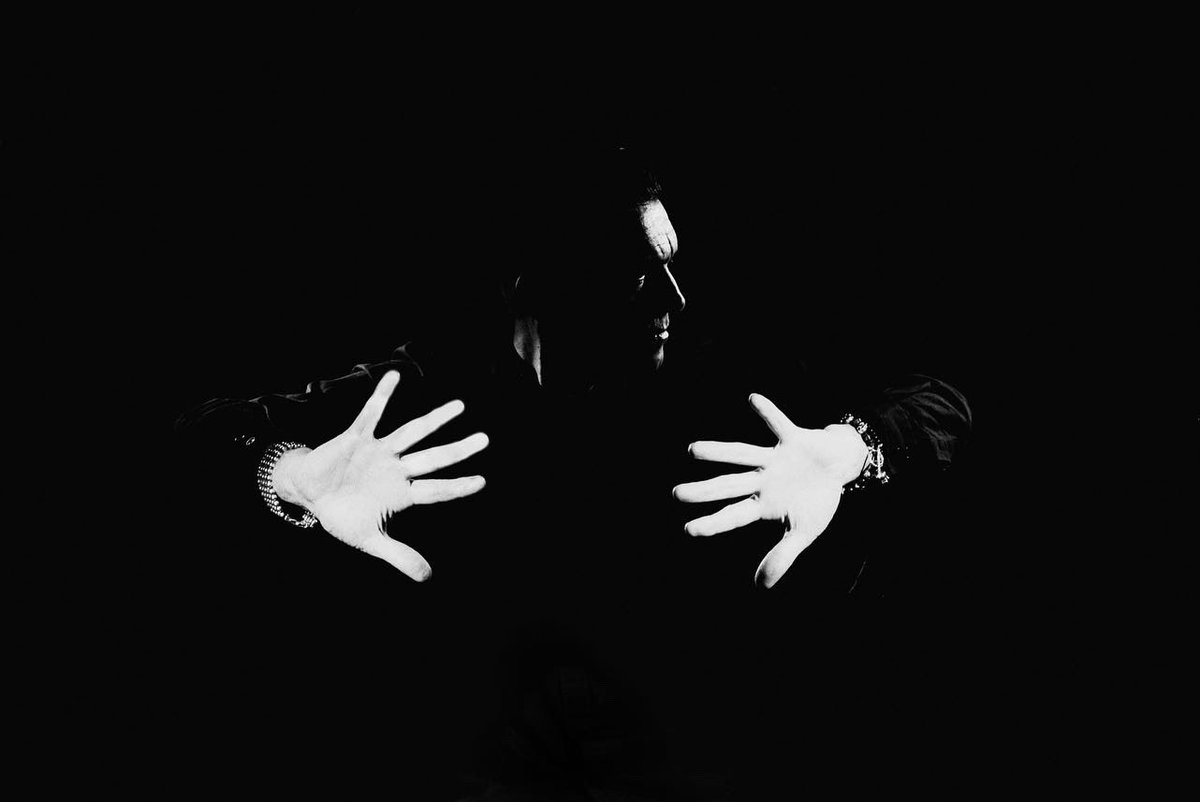
© E Gabriel Edvy
As you should.
Your latest album, The Merciless Light, an excellent work which I urge anybody to listen to, was release at the end of last year. I heard that you’re already working on a new album. How far are you in the process?
Raymond : Thank you for saying that. It is true, a lot of the music has been written. The words have been written too. But putting the two together is another story. I have the words and the music, but marrying them together might take a little time. I have a lot of material. I could release 2 to 3 albums with what I have right now. I need to purge this out and select the best songs for the record. I am quite far into the process. I have been working with a guy named Jim Davies, who plays the guitar for THE PRODIGY. We have been co-writing some music together which is very refreshing. We co-wrote 3 songs on the Merciless Light album. We are doing a lot more work together on this one. Obviously, some elements are the same. I haven’t changed that much since the last release. It’s my voice and my way of making music, my programming. But, working with Jim brings another texture. It will be slightly different. Making music is like concocting a cake, if you use different ingredients, the flavor will be different.
I am looking forward to it.
You’re traveling Japan right now. You were in the majestic Lot Valley in France over 2 months ago. How does traveling benefit your music?
Raymond : That’s right. I went to France to start the recording process of the new album. It feels nice to be away from home from time to time. My life is in London. I work in London but it’s also the place where I take the dogs for a walk, it’s the place where I run errands, do paperwork, see my family and meet my friends. And, I love that. But, sometimes, I want to be away for a little while, especially when I am trying to find my way into a record. Sometimes, I have trouble finding the direction of a record. When it happens, I escape the routine. This time, I set up a tiny and simple studio in my backpack and went to see my oldest friend in the Lot Valley (France). He has a beautiful house. He let me use a spacious room with a great view of the river. It’s marvelous, really beautiful. I wake up, take a shower, have a coffee and then, I start recording. That’s all I do. There’s no bullshit. No fuss. It helps me find a way in the record. It’s how I succeed in discovering how to achieve or deal with a new record. When I lived and worked in Berlin, the atmosphere was different. The environment changes the way I make music. So yeah, the environment benefits and affects the music.
What adjectives would you use to describe the recording environment in Lot Valley, Seattle, Tokyo and Berlin?
Raymond : That’s a difficult question. I don’t think I can answer it properly. It really depends on many things. It’s a delicate and fragile balance of influences. The environment encompasses tiny little things. Take a look at the beauty of the moment. We are here outside, together. Look at the way the sun is shining down onto the leaves of the trees, listen to the wind whispering in our ears or the sound of the train passing by. There won't be any moment like this anymore. This moment will soon be a memory. The environment encompasses what’s happening within yourself as well. The way you are feeling right now, what’s going on in your head. The emotion you are experiencing in the moment will soon be gone. The city is just an element among a mountain of other components. It’s an interesting question, an interesting idea. I think, changing things up sometimes makes you see things in a new way. Changing environment helps you change the lenses through which you see the world. You know, your decisions are largely influenced by what’s around you. Certain objects around you can trigger certain thoughts, emotions or desires. It can influence the mood. It’s just a fragile balance of influences.
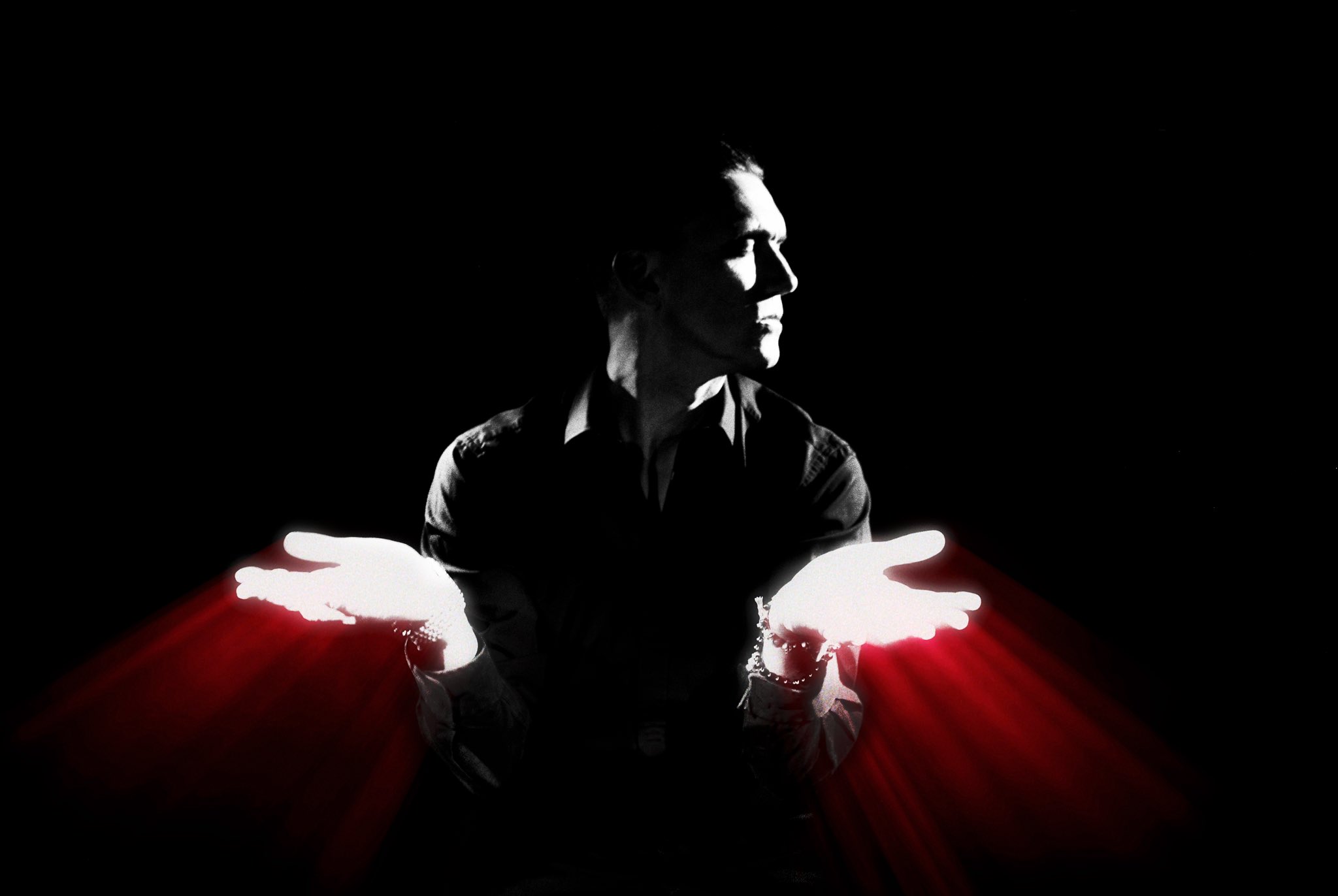
© E Gabriel Edvy
That was beautifully eloquent. I couldn’t agree with you more.
You lived and worked in the UK, the USA, Germany, France and Japan. You worked with numerous artists around the world. How do you do to successfully work across countries, languages, and cultures?
Raymond : It’s become easier now thanks to technology. E-mails are fast and easy. Before the democratization of the Internet, I had to take a plane and get to a recording studio in Seattle, Tokyo or somewhere in France. It’s becoming easier and easier. With my vocalist Michelle, who lives in Australia, we just correspond through e-mails and talk on FaceTime. I send her files and she works on them. It would be totally different if I had to go to Australia in person. There are pros and cons. It actually depends on what the people I am working with are doing. When I work with guitar players, I always want to be in the same room. I find it much easier to be next to each other to talk and tries things out. I can direct the musician : "make this part shorter, make it longer, put a little bit semi-tone over here". Working closely with guitarists is essential for me. Working with guitarists is like doing clay sculpting. We need to get out hands dirty together and to do so, I need to be in the same space. It really depends on what we’re doing. Sometimes, I like to let them do their thing and I get something back through e-mails. That being said, I used to really like being in Seattle to record music. There’s something special about its atmosphere. Seattle is a city that dances to its own beat. Seattle is musical. It’s different in Tokyo. With Japanese artists, there’s always the whole management in the recording room which is a bit weird honestly. The A&R guy, the manager, the assistant and so on. I love my A&R guy, I love my management, I love my crew but I find it a bit strange that they would be on the studio the whole time. I find it funny not to be surrounded by musicians only in a recording studio. As for me, the recording studio is about the music and the music only. In England, the recording studio is filled with musicians only and the way of doing things is always spontaneous. Musicians really try ideas, they jam. When suggestions are made in a Japanese recording studio, it is quite serious. When I worked in Japan, the management would have a lot of discussion about musical choices.
There's definitely something cultural.
Japan is known for its never-ending meetings. They always involve the whole team. Everyone is obliged to participate even if their responsibilities are unrelated. I think it’s a way to emphasize harmony and homogeneity. Everybody's in the same boat.
Raymond : Oh, interesting ! I see. I have experienced it a lot : whether it’s live set-up, stage design, music recording, setlist choice. I think it lacks a bit of spontaneity and efficiency. It’s a waste of time. That feels a bit pointless. There’s a proverb that says: "the nail that sticks out gets hammered down". Those who are too different or conspicuous get criticized or sanctioned by others. Japan seems so homogenous, its people and culture seem so similar that if you stick out in any way, you’ll be persecuted as a result. Perhaps. I don’t know. But, when the free flow of ideas occurs, it shouldn’t be threatened nor disturbed by any external talk. It’s just a different way of doing things, I guess.
As I said earlier, you have worked with numerous people around the world. What has been the best/most exciting collaboration you’ve had so far?
Raymond : I have done quite a lot. Many, many years ago, in 1989 or so, I did a collaboration with Australian composer Jim Thirlwell on a project called STEROID MAXIMUS. It’s mostly instrumental music which contains a lot of other elements like jazz. That was great. But, my favorite collaboration so far is SCHWEIN. I really enjoyed doing this project with vocalist Atsushi Sakurai and guitarist Hisashi Imai (BUCK-TICK). PIG toured with BUCK-TICK in Japan. I suggested the idea of making music together to these 2 men who have become dear friends of mine. They loved the idea. We recorded some songs in Yokohama, some other songs in London. It was an international project, interesting union. Atsushi is a fantastic person and grand singer. Imai is a genius composer and interesting guitar player. They are very different from the people I’m used to collaborating with. That was an interesting experience. I have had lots of other great collaborations. I consider myself lucky. In the 1980’s I remember doing a (pretend) house record for a laugh and I got Blixa Bargeld from Einstürzende Neubauten to do vocals. That was a fun collaboration. I have great memories (smiles).
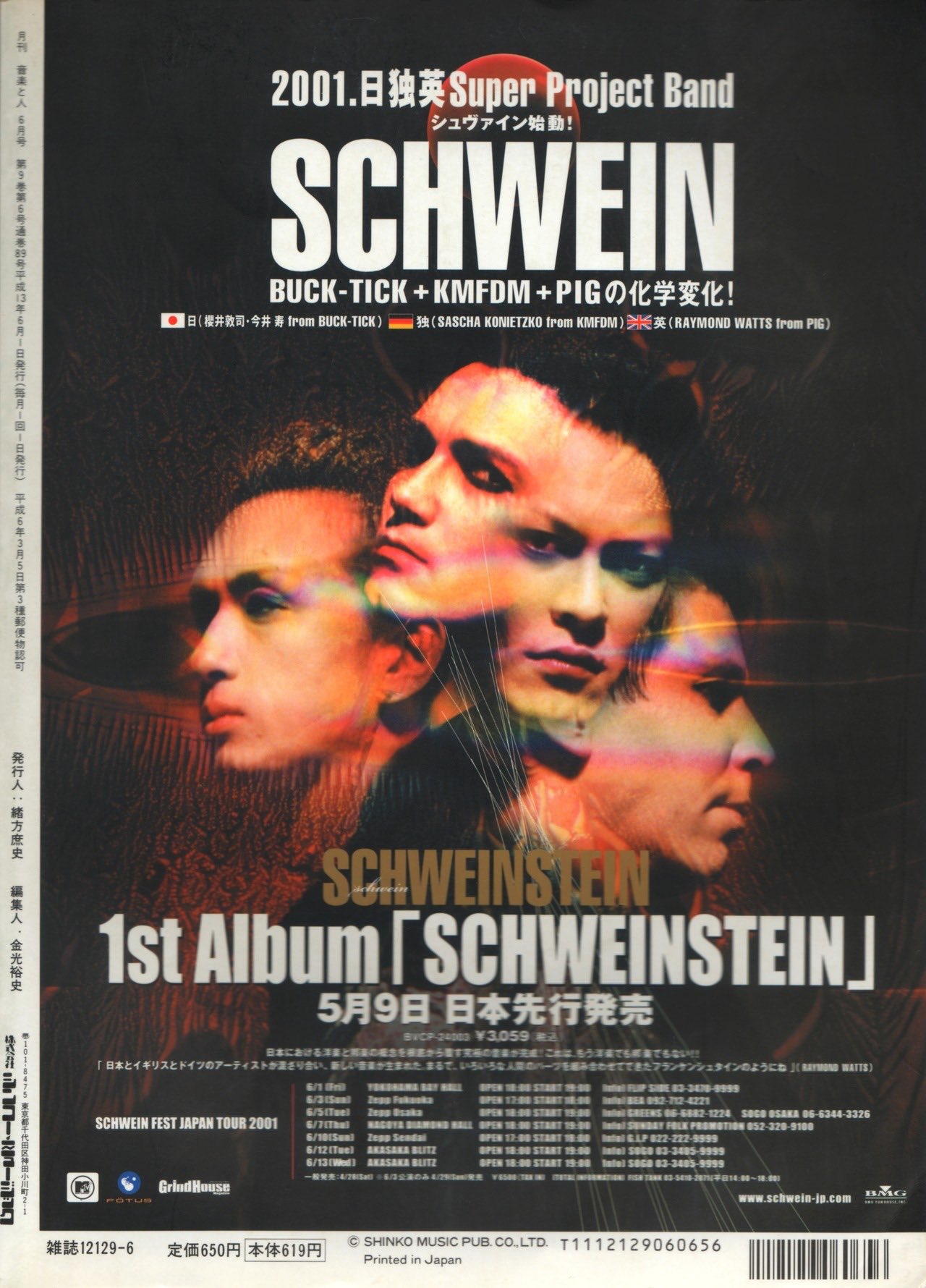
Who would you like to work with now?
Raymond : Oh, I like that question. Let me think. This has nothing to do with industrial music, but recently I have been going to the opera a lot. I like Freddie De Tommaso. He is a young opera singer whose gorgeous voice is taking the classical music world by storm. He’s a British-Italian tenor, a vocal phenomenon. That would be interesting to collaborate with him. Do you ever go to the opera?
No, I don’t.
Raymond : You should try. It’s a great experience. Going to the opera is an event that you won't forget. The singing is fantastic, the 80-piece orchestra is grandiose, the staging is fabulous. It’s the whole coming together. When you listen to opera at home, it’s great. But when you see the music, the costumes, the lightings, it’s a whole different level. It’s a fantastic, grandiose environment. It takes the music to another level. It’s a great experience to have at least once. The coming together of all these beautiful elements creates the magic.
You got me interested. I am adding this on my bucket list.
You are a polyglot, right?
Raymond : A polyglot (smiles, surprised) ? No, I’m not, at all. Nah (laughs). Honestly, I have lived in Germany for 6 years yet I don’t speak any German. I know some basics but my grammar is all over the place. I lived in France for a long time, my girlfriend was French and yet, I couldn’t manage to learn the language. It’s kind of embarrassing to say. I really am not a polyglot. I’m terrible at learning languages. But I do sing in German, sometimes. I used to be in a band called KMFDM, a German band. There was a guy named En Esch who also collaborated with me on the PIG project. When I sing in German, I first write roughly what I want to say and he corrects it, he makes sure it’s grammatically accurate. And then, we sing it together. He refines my pronunciation and intonation. The German language sounds industrial, it’s dark, powerful and sharp. But, I am definitely not a polyglot. I know some words in other languages that I want to use in my songs. But that’s about it.
I do agree, German is perfect for industrial music.
When you work/hang with vocalist Atsushi Sakurai and guitarist Hisashi Imai from SCHWEIN (BUCK-TICK), what language do you use?
Raymond : We speak Janglish which is an unorthographical and nonsensical mixture of Japanese and English (laughs). When we worked together on the technical side of the music, we sometimes used a translator. But music is another language. The music speaks for itself.
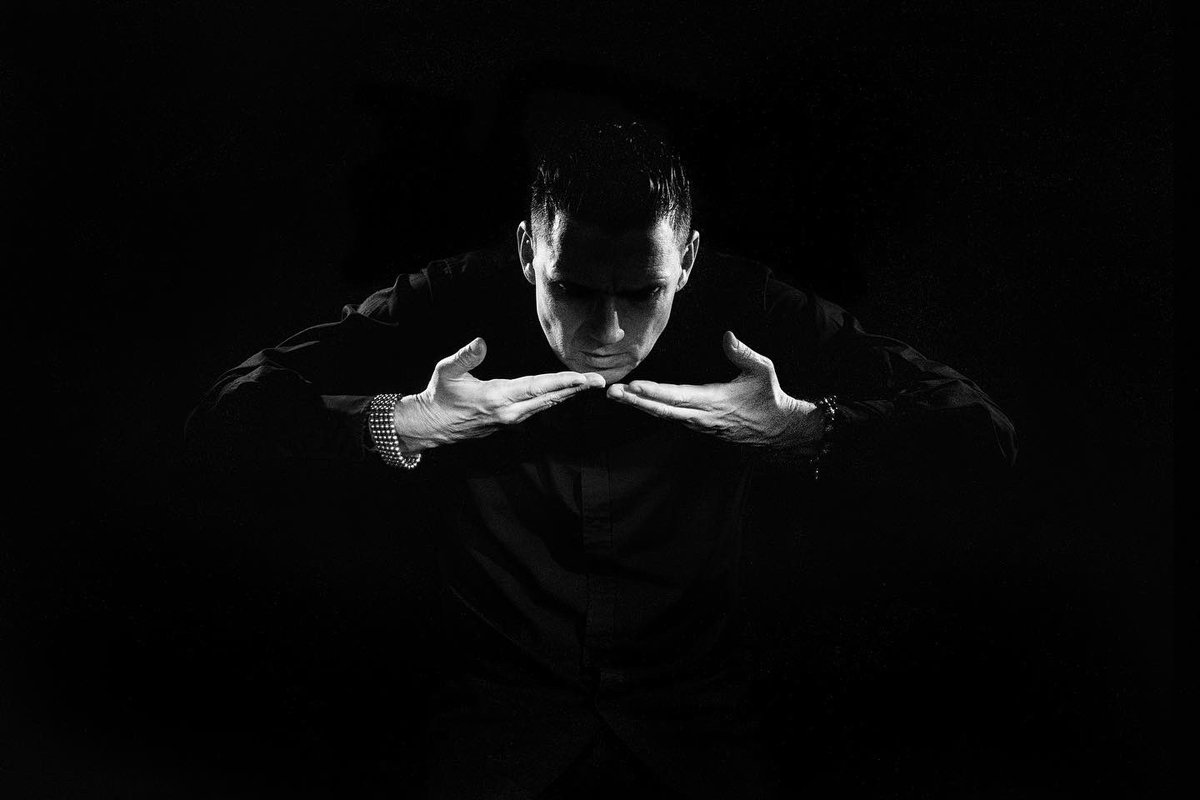
© E Gabriel Edvy
It does.
Your musical expression, including your voice style, is unique. When you started making music, was it something you had in mind, being unique?
Raymond : Honestly, I just open my mouth and sounds come out (smiles). More seriously, it was not something I had in mind. I just did what I wanted to do and I still do what I want to do. It’s never calculated. When I started PIG, I was living in West Berlin and Hamburg, (Germany). In the 90’s my life was a big roller-coaster of many things I was working through as a person. I was not in a happy place. I was digging myself deeper and deeper into a darker and darker pit with no way out. It was real descent into the darkest places I have ever been in my life. Life was exciting but it was all too extreme : extreme behavior, extreme drug use, extreme working, extreme touring. I felt like I needed to go to darker and darker places to create new material for the next record. And then, by the early 2000’s I was almost burnt-out. I didn’t know where to go. I was lost creatively. So, I stopped and did very different things. I took another path and changed my life. When I got back to PIG in 2015, I reconnected to the way I was thinking and making music when I was much, much younger. Making music is fun and should be about playing. Now, I am not going to the darkest of the darkest places within myself anymore. I just want to be enjoying the music for itself. I just want to play it. I think, real art, real creativity, comes from the spontaneous flow of ideas. It’s a process that takes place itself, without any external aid. It’s about messing about, trying things, making mistakes. I was reminded to go back to when I was really young, when I was exited to make music. In the 70’s, I had a mini cassette recorder. I would literally bang on biscuit tins and make guitar noises with my mouth before I could buy my first little guitar. I went back to basics. It’s modest, not so grand but much more fun and more connected to the creativity that lives within myself. I don’t go to the darkest places to find creation. I find creation within my inner child. Drugs have had a long history in relation to artist creativity. It’s used as a means to access buried modes of consciousness through an alteration of the mind’s experience of the present moment. But it’s dangerous and fake. It was a blessing to find out that I could be creative without drug use. My music is now an inside journey.
Congratulations on your sobriety. It reminds me of a quote that says "every child is an artist. The problem is how to remain an artist once we grow up". I heard that, with PIG, you wanted to do something more extreme, more experimental than the music you were creating with KMFDM.
Raymond : At the time, I was working with a lot of cool little bands from the Neue Deutsche Welle scene, which is a genre of West German rock music originally derived from post-punk and new wave music with electronic influences. I worked with Psychic TV and Foetus. Then, I started the KMFDM project. But, I wanted to do something more extreme and more experimental. I’m not being rude about them, but the music they were doing was a bit boring and tame for my liking. What they came up with was not as dark as I wanted it to be. I like En Esch (KMFDM) and I like his work with me on the PIG project. But, back in the early 80’s, I really wanted to push the envelope further. I wanted to be totally free artistically. I wanted to drive my own vehicle and be able to crash into a wall, drive over a cliff. Sometimes, it would get me to a palace of sonic fabulousness, and other times, it would take me to a dungeon of misery. I needed that freedom. I wanted to take PIG to unseen places. And that’s what I still do today, driving my own car. I march to the beat of my own drum.
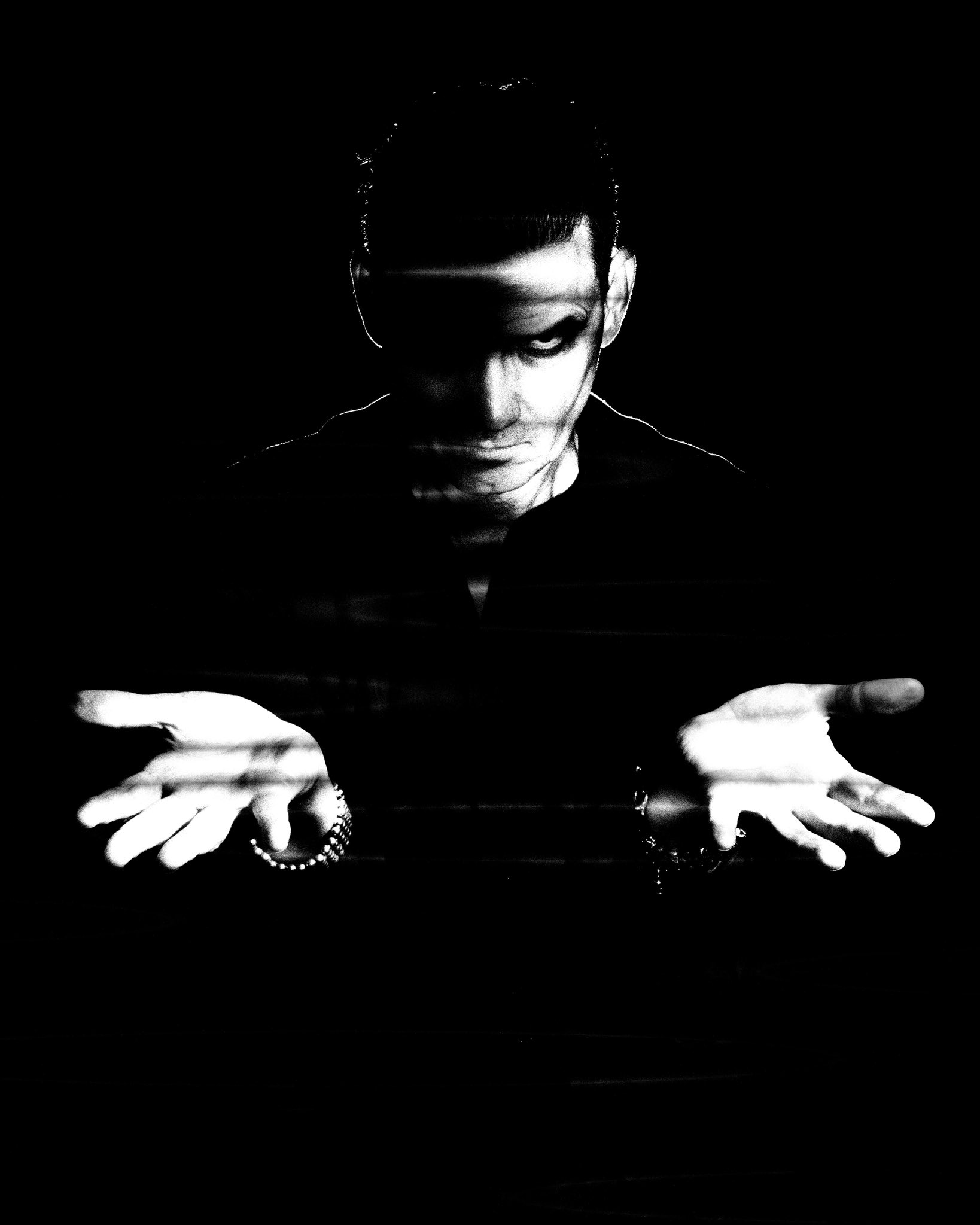
© E Gabriel Edvy
I bet you do.
Why didn’t you just go by your name Raymond Watts?
Raymond : Good question. I don’t know. I love the word "pig". It’s just a short, arresting, simple word. The metaphorical uses of the word have negative connotations, commonly used to insult a person as dirty, greedy or objectionable in other ways. But, pigs are extremely intelligent, incredibly misconstrued. If I were to look into the whole why, I think I was probably drawn to this obscure misunderstanding. Perhaps, it resonates with my inner self.
I see.
PIG is considered a hero in the industrial scene. How does it feel to be seen as a mainstay of industrial music? Are you aware of it?
Raymond : I don’t know about that (laughs). I’m not aware of that. I’ve never felt that way. I’m not a mainstay of anything. I’d rather not be aware of things like that. I’d rather do my thing, my humble thing. I want to be free of anything like that. Free of expectation and pressure. I like that about PIG. I’ve always tried to keep it willfully obscure. It’s quite difficult to get the CDs for example. A lot of my work with PIG isn’t on streaming platforms and I’m quite happy about that.
You decided to go solo for music challenges and creative freedom. If KMFDM wasn’t satisfactory enough, what inspired you to form another band, SCHWEIN, a groundbreaking project by the way, along with Sasha (KMFDM), Imai and Sakurai (BUCK-TICK)?
Raymond : Simple, I adore Atsushi Sakurai and Hisashi Imai. They are great people and very talented artists. I like their work. They are eclectic. They are really opened to different kind of music. They like taking challenges, going to various directions. They are artistic, thoughtful, sophisticated, open-minded and curious. I just like them and obviously, I wanted to work with them. We created SCHWEIN together and it worked wonderfully. As for Sasha, I used to work with him on the KMFDM project. I left the band and rejoined in 1994. I did a lot of work with them. We toured in America together. At the time, I was coming back to Japan quite a lot. I was working with The Hit Parade, a pop band. Sasha seemed to be willing to go to Japan. He was always saying : "I want to go to Japan, I want to go to Japan". I invited him to work on the project. But, he didn’t join us on the tour. He dropped out which wasn’t great… I don’t know why he decided not to come… I think, he got sick or whatever. Anyway, I asked Bryan Black from BLACK ASTEROID and Arianne Schreiber to come along. And that was fine. It was a memorable tour.
I hope you’ll brink back SCHWEIN to life.
How is the writing and recording process like as a solo artist as opposed to working with a band? What are the pros and cons of both processes?
Raymond : To be honest, I’m always quite solo (laughs). There’s more to do when you do everything on your own, which I like. I like to get things done myself. I need to have my hands full. I need to work. I love working as a solo artist. Collaboration is a weird thing for me. Often, when I collaborate with somebody, the person presents some music material to me. Sorry I am going to be really honest here, the first impression I have is always negative. My initial response is : "Oh my God, what am I going to do with that?". I have no idea what to do with what is presented to me. I feel like I have nothing to say. I always think : "I can’t do anything with it. If I had written that myself I would have put it in the bin" (laughs). But, precisely because somebody presents it to me, I want to try my best to work it out. It becomes a challenge which is the pure essence of a collaboration. Its essence lies in the fact it takes you to unknown places, places you wouldn’t have gone on your own. A collaboration is an interesting thing.
Indeed.
You have been in the music industry for your whole life. You’ve seen it changing over the years. When were you first aware of the internet's impact on the music industry?
Raymond : I started seeing a change in the late 1990s and early 2000s. It’s the moment when I really felt like the music industry was shifting. It did coincide with me feeling like it was time to explore the possibilities and benefits of stepping off the downward spiral of never-ending touring, extreme recording, massive drug use and other addictions. It coincided with me realizing that I was caught in the swirl of darkness. It’s the moment I realized I wanted to get off the bus and take another path. When the democratization of making music happened, my initial response was : "oh shit, we’re fucked". I had an aversion towards its democratization. I thought anyone could do it. It was shocking. Now, I feel like this is the greatest thing. If you want to stand out, you need to be extra good. Before it was special and limited to the people who could afford going to a recording studio. I first went to a music studio in 1978. It was a 16-track recording studio to be precise. It felt like the Holy Grail. It was a sacred place because it was expensive and difficult. Now, everybody can have a recording studio in their laptop. Isn’t it crazy? I love it. You need to push yourself further to be good and stand out.
You think that back in the days, the limitation of possibilities made you push the sound further ?
Raymond : Yes, that ! Absolutely, yes. The limitation of possibilities made you push the sound further. The first KMFDM album I did- in which there is a couple of PIG songs (wrote completely on my own), was in a 8-track recording studio. I had one sampler with one-second sample time. I couldn’t edit the bottom nor the front. It was really limited. I had one synthesizer and one drum machine. And that was it. I had to make magic work with very few possibilities. I had to push the sound further. When you are limited, you have to challenge ideas to the edge of their possibilities. Now, you pull up a synthesizer and you 3000 presets are presented to you. It’s what I call the "tyranny of choice". And it holds you back. Instead of facilitating your freedom and creativity, the abundance of choice limits you. Learning to choose is complicated. Learning to choose well is more complicated. And learning to choose well in a world of unlimited possibilities is perhaps too complicated. Choice can spoil your ability to push the boundaries. As I always say, less is more.
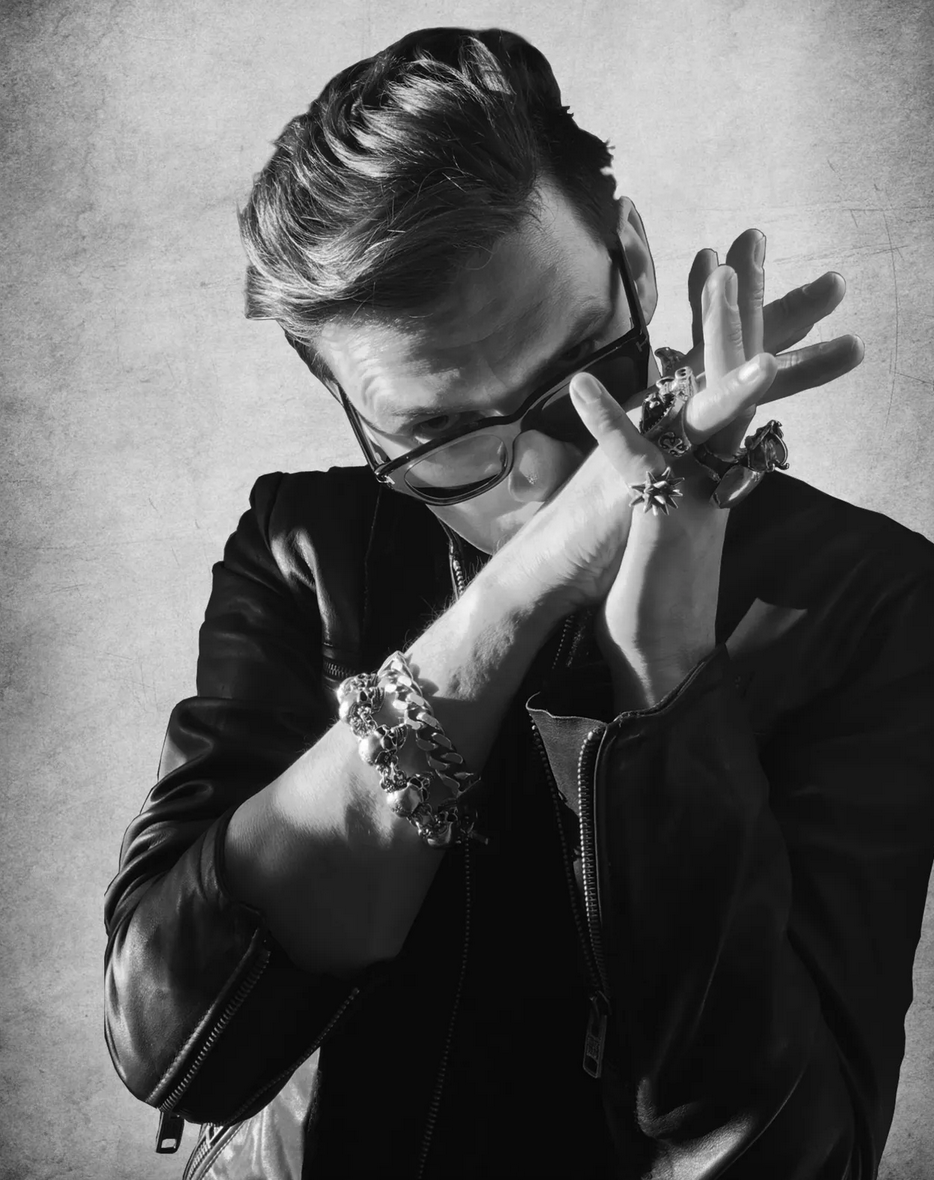
© E Gabriel Edvy
You said earlier that you don’t want to put your entire discography on streaming platforms. Don’t you feel like you are losing money? Streaming services are now giving the music industry its biggest profits in a decade.
Raymond : PIG is not the most profitable project of the century (laughs). But, you are probably right. Maybe I should look into that. I’ll see the guys of SCHWEIN as well and we’ll talk about it. I’d love to re-release the earlier work of PIG.
You went on a hiatus in 2006 that lasted for nearly a decade. During this time, you composed music for fashion shows including Alexander McQueen’s.
Was it challenging ?
Raymond : I loved it. Working with Alexander McQueen was grand. You’d think that, because it’s haute-couture, a smart brand, they would say "we want something that is really polished and fabulous". No, that was quite the contrary. They always wanted the darkest, the weirdest, the dirtiest, most sinister music. Isn’t it funny? I made music that accompanied their films, show openings and runway shows. It was great working with them. I loved it (smiles). The musical director of McQueen was a guy I was in a band with, a proper dirty industrial band from the early 80s. His name is John Gosling. He was in Psychic TV. He later became a DJ and then, he became the musical director of Alexander McQueen. He the one who introduced me to this British fashion designer and couturier. Our history is quite experimental and obscure.
After a decade hiatus, what made you come back to PIG? What was the trigger?
Raymond : Really simple. I had a massive drug and alcohol addiction for years and years. I went to rehab and got clean. I came out, went back home. An email came through from a promoter that said : "would you like to come to headline an industrial festival in Calgary, Canada". I thought it sounded great. I asked En Esch (KMFDM) to join me. He agreed. And that’s how PIG came back to life. The concert turned into a 26 date-tour in America. Then, the promoter asked me whether I had new material to promote. I said I didn’t. He told me : "then you better get started making a new record". That’s what happened. And here I am today having an interview with you in Japan.
Which delights me.
When are we going to see you on tour in France or Japan?
Raymond : Since Brexit, it has become very difficult to go to Europe which is a pity. It’s a real disaster for the country. It’s the worst self-inflecting wound we could ever commit onto ourselves in terms of relationship with our neighbors. I hope I will be able to come to these 2 countries in the not-too distant future. I’d love to tour Europe and Japan with PIG. I hope I’ll be able to make that happen soon.
Then, I hope to see you on tour very soon.
Thank you for this absolutely delightful interview and wonderful time.
_______________________________________________
Support PIG's music on Spotify | Bandcamp
Show Raymond Watts some love on Instagram | Twitter
Praise the Lard ! Website

